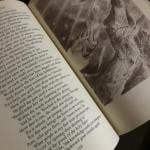 We find ugliness easier to describe than perfect beauty. Stories of villainy or of complicated people are easier to write than the deeply virtuous: Lancelot is easier to write than Galahad. Peter Jackson could not make Aragorn as Tolkien made him, but introduced “growth” into a character that was already mature and kingly by the time Tolkien presents him to us in Fellowship of the King.
We find ugliness easier to describe than perfect beauty. Stories of villainy or of complicated people are easier to write than the deeply virtuous: Lancelot is easier to write than Galahad. Peter Jackson could not make Aragorn as Tolkien made him, but introduced “growth” into a character that was already mature and kingly by the time Tolkien presents him to us in Fellowship of the King.
Ugliness also can be more memorable as many readers of Dante’s Comedy demonstrate. Most of the Comedy contains no devils, even much in Inferno, yet in some imaginations Dante is all about devils and hell. His work is more about love, failed love, human love, a mentor’s love, especially Divine Love. The devils are incidental and often comic relief the few times they appear. Satan Himself is impotent, trapped by his own self pity, in ice made by his own tears and furiously beating wings. Dante himself suspected that memory sometimes is a problem in intellectual activity and grasping the truth:
I have been in that Heaven of His most light,
and what I saw, those who descend from there
lack both the knowledge and the power to write. For as our intellect draws near its goal
it opens to such depths of understanding
as memory cannot plumb within the soul. Nevertheless, whatever portion time
still leaves me of the treasure of that kingdom
shall now become the subject of my rhyme.*
Often memory is a great aid to reason, bringing to mind past experiences that we can put together in new ways. The past can inform the present, yet memory also can deceive. Memory can fail or get distorted. If so, then memory can hinder the truth. Some truths are eternal, while the application of the truths change with times. Other truths are subjective. My favorite ice cream of twenty years ago is no longer my favorite ice cream today: goodbye butterscotch, hello peanut butter and chocolate.
God Himself, in traditional theology, knows what He knows without the use of memory. All things are present to God in divine timelessness and so He knows and any use of the term “remember” is an image to help us understand, similar (though not quite the same) as saying God has an “arm” or “sees.” A few times in my life, while solving a logic problem or understanding a tough text, I have just “gotten” the solution or an insight. I was not (at least consciously) remembering,**but seeing in a new way now. Memory, meditating on past failures or theories, would have impeded by getting the new solution.
God knows and as creatures in His image sometimes we get “it.” This happens when a first-year student suddenly has an insight on first exposure to a text that has escaped many experienced readers! Memory can keep a group or an individual from having this experience or sharing the insight. Jesus came to us and many of us missed Him, because He came in a way we did not expect or a way that was new. A person could be with Jesus or miss Jesus thinking about the coming of the Messiah.
I once knew a man who was sitting in the middle of a revival in his church who was sad because God was not sending a revival. He was missing what God was doing, remembering what God did and how God did it. He sat in darkness praying for light because he would not open his eyes.
The Greek philosopher Plato presents another reason people retreat to comfortable memories and turn from the light of reason***.
“And, if he compelled him to look at the light itself, would his eyes hurt and would he flee, turning away to those things that he is able to make out and hold them to be really clearer than what is being shown?” “So he would,” he said. “And if,” I said, “someone dragged him away from there by force along the rough, steep, upward way and didn’t let him go before he had dragged him out into the light of the sun, wouldn’t he be distressed and annoyed at being so dragged? And when he came to the light, wouldn’t he have his eyes full of its beam and be unable to see even one of the things now said to be true?” “No, he wouldn’t,” he said, “at least not right away.”*****
When we first open our eyes, or see a new truth, we might be dazzled. Sometimes this is pleasurable, often it is like turning on the lights quickly in a darkened room after a good movie. We cry out, it is a bit painful, and we do not like seeing the piles of empty candy wrappers, popcorn pieces, and empty Diet Coke cans that were invisible in the dark. The room looked better in the dark.
So it might be when we see a new scientific, historical, theological, or philosophical truth. We might have to change our minds! Memory can become tailored over time, worn smooth in retelling, and so prevent us from seeing something good, true, and beautiful. We might wish to close our eyes again and not know rather than be annoyed or dazzled.
Or so Dante (and Plato) suggest.
—————————————————————–
*Dante Alighieri. The Paradiso (Signet Classics) Canto I lines 6-12 (p. 2). Penguin Publishing Group. Kindle Edition.
**Leave aside what Plato means by “remembering” and use the term as most of us do.
***Dante uses the dazzling of the light several times in Paradiso.
*****Plato. The Republic of Plato: Second Edition (Bloom translation) Book VII (p. 194). Basic Books. Kindle Edition.












